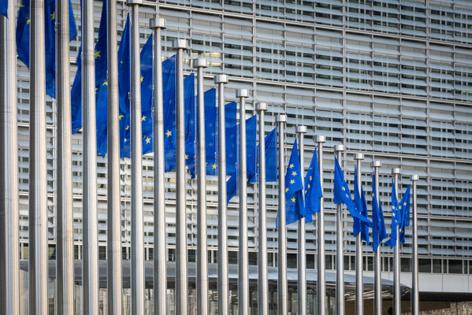EU frets over US demands in trade talks it sees as unbalanced
Published in News & Features
The U.S. is demanding the European Union make what the bloc’s officials see as unbalanced, unilateral concessions as part of ongoing trade talks, setting up a tough decision over whether to move ahead with countermeasures if the terms of any deal don’t improve.
The best-case scenario remains an agreement on principles that would allow the negotiations to continue beyond an early July deadline, according to people familiar with the matter.
Among Washington’s requests are measures relating to quotas for fish exports that EU officials say may be incompatible with World Trade Organization rules; tariff-related moves that aren’t mutual; and a series of demands on economic security described by the officials from the bloc as far-fetched, said the people, who spoke on condition of anonymity to talk about private discussions.
Many of U.S. President Donald Trump’s tariffs would stay even in the event of a deal, the people said.
The EU, which has been seeking a mutually beneficial deal, will assess any end-result and at that stage decide what level of asymmetry — if any — it’s willing to accept, the people added.
Member states will likely have a range of views on the matter, and a 95 billion euro ($110 billion) list of potential additional tariffs on U.S. goods that Brussels has formulated risks being watered down by requests for concessions within the bloc.
A European Commission spokesperson declined to comment to Bloomberg News on the status of the talks. “We are fully and deeply engaged in negotiations. A negotiated, mutually beneficial solution remains our preferred outcome,” the spokesperson said.
The EU is rushing to clinch a deal with Trump before tariffs on nearly all its exports to the US jump to 50% on July 9. The U.S. president has blasted the EU – which he has said was created to “screw” the U.S. – over its goods surplus and perceived barriers to American trade.
Trump spent much of a 20-minute meeting with European Commission President Ursula von der Leyen — on the sidelines of the Group of Seven summit in Canada this week — repeating those grievances and complaining about barriers he claims U.S. carmakers face, the people said.
The EU estimates that U.S. duties now cover 380 billion euros ($438 billion), or about 70%, of its exports to the U.S.
The White House didn’t respond to a request for comment on Saturday. Trump complained earlier this week about the EU talks, threatening to give up and impose unilateral tariffs.
“We’re talking, but I don’t feel that they’re offering a fair deal yet,” Trump told reporters on the flight home from the G7 meeting. “They’re either going to make a good deal or they’ll just pay whatever we say they have to pay.”
Asked on whether the EU would retaliate if a baseline tariff would stay, von der Leyen told reporters at the G7 that “from the very beginning, we have always said that we have different instruments on the table and they stay on the table till the very end, and this is also the case today.”
The bloc has stepped up its engagement with the U.S, pledging fast-track negotiations to reach an agreement. Chief trade negotiator Maros Sefcovic held meetings with U.S. Trade Representative Jamieson Greer and Commerce Secretary Howard Lutnick over the past week.
The U.S. and EU are conducting in-depth discussions on critical sectors – such as steel and aluminum, automobiles, pharmaceuticals, semiconductors and civilian aircraft – as well as on tariff and non-tariff barriers, in addition to strategic purchases and economic security.
While talks are taking place in a positive environment, they remain difficult, particularly with regards to the sectoral duties, said the people.
Trump has introduced 25% tariffs on autos as well as on steel and aluminum. He’s also announced the doubling of the metals levies and is working to expand tariffs on other sectors, including pharmaceuticals, semiconductors and commercial aircraft.
As part of proposals shared with the U.S. late last month, the EU has offered to gradually work toward zero-for-zero tariffs on cars, industrial goods and non-sensitive agricultural goods by looking at quotas as interim steps. The bloc is aiming to address U.S. requests on non-tariff barriers through its simplification agenda, which will cut regulations in a number of sectors. Maintaining the EU’s autonomy in regulatory and tax matters remains a red line.
Although the EU is pushing to get a reprieve from some of Trump’s universal and sectoral tariffs, the bloc expects that many of the levies will remain, leading to asymmetrical arrangements, said the people.
Because of that, in parallel to ongoing talks with the Trump administration, the EU continues to prepare counter-measures should negotiations fail to yield a satisfactory result, or if the bloc opts to move ahead with measures to correct any imbalances.
The EU has approved tariffs on 21 billion euros ($24 billion) of U.S. goods that can be quickly implemented in response to Trump’s metals levies. They target politically sensitive American states and include products such as soybeans from Louisiana, home to House Speaker Mike Johnson, as well as agricultural products, poultry, and motorcycles.
The bloc has also prepared an additional list of tariffs on 95 billion euros ($110 billion) of American products in response to Trump’s so-called reciprocal levies and automotive duties. They would target industrial goods including Boeing Co. aircraft, U.S.-made cars, and bourbon. Input provided by member states and other stakeholders asking for relief covers as much as 70 billion euros ($80 billion) of the proposed package, according to people familiar, although the bloc’s executive arm has made clear it will not fulfill all the requests for changes.
The EU is also consulting member states to identify strategic areas where the U.S. relies on the bloc, as well as potential measures that go beyond tariffs, Bloomberg previously reported.
———
(With assistance from Josh Wingrove.)
©2025 Bloomberg L.P. Visit bloomberg.com. Distributed by Tribune Content Agency, LLC.







Comments